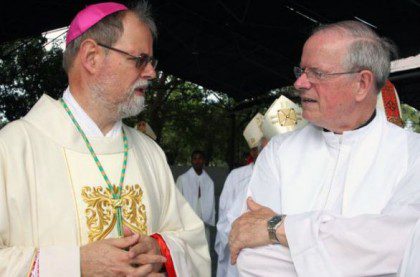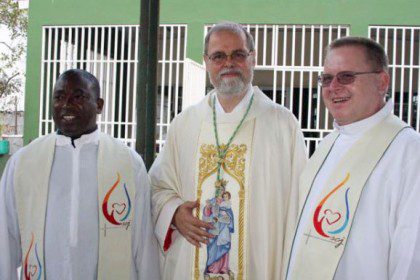
Archbishop’s ordination filled with African traditions
The following was written by Fr. John van den Hengel, the general councilor who inherited Archbishop Claudio Dalla Zuanna’s job of vicar general following the archbishop’s appointment. Fr. Tom Cassidy, provincial superior of the U.S. Province was also at the ceremony.
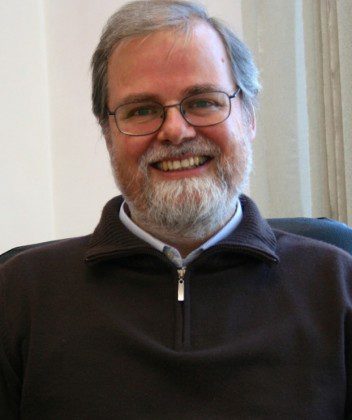
On Sunday, October 7, the feast of the Holy Rosary, the patronal feast of the archdiocese, Claudio Dalla Zuanna, SCJ, was ordained as Archbishop of Beira, Mozambique. It was a truly impressive four-and-a-half-hour long liturgy. The ordination was held in the basketball stadium of the Ferroviario da Beira club, jam-packed with 8,000 singing, swaying, dancing, hand-clapping and praying people. It was African liturgy at its best.
The people gathered at 8:30 and poured out of the stadium only after 1 p.m. The ordaining bishop was Dom Lucio Muandula, the president of the Bishops Conference of Mozambique. In his homily he said, “We hope that the archbishop will have a permanent ear to hear what the Holy Father has asked him to do: to bring the grace of God to the people so that the evil one will not overcome the kingdom of Christ.”
For Dom Claudio, who from the beginning has insisted on the centrality of the Gospel, the holding of the book of the gospel as a canopy over his head while the community prayed and sang was especially impressive. At the end of the service, Dom Claudio expressed his anxiety over the mission that he had received as a call from God and pledged to be a good shepherd for his Archdiocese.
“I commit myself”, he said, “to offer you my life. In return I ask of the people of the archdiocese of Beira that they help me be their bishop and I guarantee you my respect and my efforts in the service of Jesus Christ.” He spoke of his mission in the context of his motto “Ut vitam habeant” from the Gospel of John, expressing his desire that “God become the main source of life” among his people in his adopted land and diocese.
The celebration began on Saturday morning. Together with Br. Vincenzo and Fr. John van den Hengel, Fr. Claudio flew from Maputo to Beira, arriving at 8:30. As the plane arrived on the tarmac, one could see near the airport terminal a great number of people gathered to welcome him. On emerging from the plane he was met by the Nuncio to Mozambique, the Archbishop emeritus of Beira, Dom Jaime Goncalves, the Archbishop of Maputo and the administrator-bishop of the Archdiocese during the interregnum, Dom Joao Carlos Harao Nunes. Also Fr. Claudio’s two brothers and two sisters were there with their spouses, and a representative group from his home-parish of San Nazario (Vicenza) in Italy.
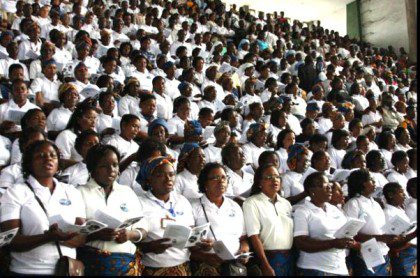
The crowd of at least 500 people was jubilant in their welcome. Among them was a large choir of children, who had people clapping and swaing with their songs, and a group of dancers in native dress who welcomed him with drums and dance. In procession through the city from the airport, they brought Fr. Claudio to the Archdiocesan house where he received the keys. This was followed by a tour of the house.
After the ordination service on Sunday and the dinner in the school attached to the Cathedral, there were presentations by students of various ages with song and dance – even a bit of a parody of Dom Claudio as a bishop. It ended with Dom Claudio displaying his own ability to dance to the great delight of the crowd.
With this ordination his work as Archbishop begins. His diocese is large – 78,000 square kilometers, the size of Portugal – consisting of three provinces. Although the main roads are paved – but in bad need of repair – the other roads are sand with large holes, making travel difficult. The city of Beira is a port city that also functions as a connection to the sea for Zimbabwe , Malawi and Zambia. It is a sprawling city with an estimated one million inhabitants. Many people who have moved to Beira from the countryside are living in makeshift houses made of poles and sticks with thatched roofs made of the ubiquitous grass.
As soon as one moves outside of the city of Beira, one encounters many small towns and villages, with the people surviving on meager agricultural efforts and the production and marketing of all sorts household goods, clothing and other everyday objects. Everyone has something to sell. Markets are found everywhere and are the major gathering points of people.
The estimated of the number of Catholics is no more than an estimate: it is thought that there are about 800.000 Catholics living in the Archdiocese of Beira (58% of the population). The diocese consists of 33 parishes, served by 29 diocesan and 49 religious priests and 84 religious sisters. The calculation of the number of Catholics is difficult because also here sects have made major inroads, particularly in the poorer areas of cities.
Br. Vincenzo
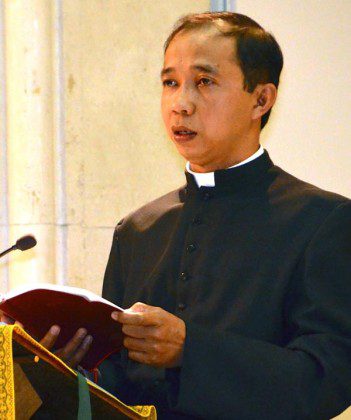
Br. Vincenzo came from the Generalate with Dom Claudio to live with him for the first eight months. He will take care of the Bishop’s House and the grounds; his first task will be to analyze the condition of the property. The house dates back to 1954 but has received no major maintenance in all those years. It means that the electrical and plumbing date back 56 years. Br. Vincenzo will oversee the renovation of the house.
At the airport someone asked, “Where is that great man who came with Dom Claudio?” He was referring to Br. Vincenzo. Brother Vincenzo is from the Indonesian Province, currently living and working at the International College in Rome. Dom Claudio has asked him to take the role of superior of the house, in-charge of the maintenance and the daily running of the Bishop’s House. There is a lot to be done. When he first heard of the condition of the house, Br. Vincenzo approached Dom Claudio in Rome and asked if he could help. He simply said, “Ecce Venio, if you want me to come.” We wish him well.
Dom Claudio’s family will make a tour of the country where Dom Claudio worked for eighteen years prior to coming to Rome as a member of the General Council, and since 2009, as Vicar General. They were deeply impressed and visibly moved to witness the response Dom Claudio received in the stadium from the people.
The Congregation wishes Dom Claudio a fruitful ministry in Beira. Our hope is that what Dom Claudio said at the end of the long ceremony of ordination will be fulfilled: “I came here that the people may have the life from God: Ut vitam habeant – May they have life.”
